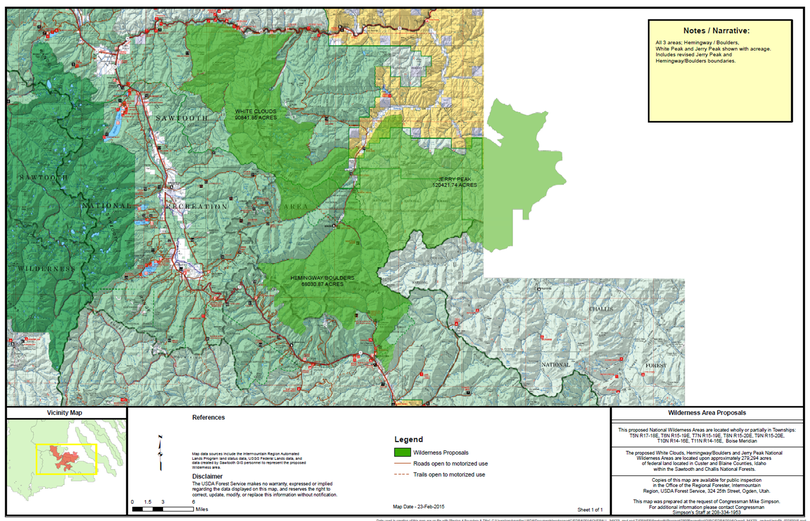Boulder-White Clouds Wilderness bill headed for Obama’s signature

UPDATED with local reaction 2:05 p.m.
PUBLIC LANDS -- Acting quickly after Monday's committee approval, the U.S. Senate today unanimously approved a bill to officially designate the Boulder-White Clouds Wilderness in central Idaho.
The quick action -- which follows more than 40 years of debate among ranchers, recreationists, environmental groups and politicians -- protects more than 275,000 acres of public land as wilderness, the country's most restrictive federal public land designation. No motorized vehicles or equipment or even mechanized gear such as bicycles are allowed in wilderness areas.
The legislation was sponsored by Sen. James E. Risch (R-ID). A companion bill, introduced by Rep. Mike Simpson (R-ID), cleared the U.S House of Representatives on July 27. The measure is headed to President Barack Obama for his signature.
The Boulder-White Cloud Mountains feature 10,000-foot peaks, sparkling alpine lakes, flower-filled meadows and a wild mix of wildlife. The region is already well-known for hunting, fishing and other recreation.
The plan approved by Congress creates three new wilderness areas in the rugged Boulder and White Cloud Mountains:
- The 138-square-mile Hemingway-Boulders Wilderness,
- The 142-square-mile White Clouds Wilderness,
- The 183-square-mile Jim McClure-Jerry Peak Wilderness.
Passage of the bill comes after four decades of debate and proposals. A stalemate let President Obama to consider the Boulder White-Clouds for national monument status, which he could accomplish by executive order.
The national monument option was favored by mountain bikers so they could keep more of their riding areas open under the less-restrictive monument regulations.
The political teamwork needed to pass the Boulder White-Clouds bill is encouraging to Phil Hough, executive director of the Sandpoint-based Friends of the Scotchman Peaks Wilderness. The group has been working for nearly a decade to garner support for protecting an 88,000-acre roadless area that straddles the Montana-Idaho border northeast of Lake Pend Oreille.
"This is an historic day," he said Tuesday. "Not only have we preserved this fabulous wild area in central Idaho, but we've also reached a moment in time when the Idaho delegation came together to craft an Idaho solution for wilderness.
"The Owyhee Wilderness in southern Idaho was designated six years ago in an omnibus bill, but you have to go back to the 1980s for the last time the Idaho delegation came together to support wilderness."
Hough, who traveled to Washington, D.C., in May to meet with the Idaho delegation, says the Scotchman Peaks are in good position to be the next Idaho candidate for wilderness. The Bonner County Commission joined other groups in support of the Scotchman's proposal earlier this year.
John Roskelley, former Spokane County Commissioner, worked in the Boulder-White Clouds in 1972 for the U.S. Bureau of Mines mapping and sampling hundreds of old claims and mines.
"This land was up for Wilderness designation and our job was to determine the mineral wealth that was left after a hundred years of gold and silver mining," he said.
"It's a beautiful mountainous area, but it has been abused by miners and loggers. As a designated wilderness, the area will be a great draw for hikers and backpackers."
The Boulder White-Clouds bill had diverse support of groups including the Sawtooth Society, the Custer County Commission, East Fork of the Salmon River Ranchers, the Idaho Farm Bureau, the Idaho Cattle Association, Idaho Outfitters and Guides, the Pew Charitable Trust, the Idaho Conservation League, the Wilderness Society, Backcountry Hunters & Anglers, the Sierra Club and the Idaho Recreation Council, which represents motorcycle and snowmobile riders.
“Pew has worked with the Idaho delegation and local partners for more than a decade to move this legislation forward," said Mike Matz of the Pew Charitable Trusts public lands program, as he thanked the Idaho delegation for their persistence.
"It has been a challenging path over many years, with difficult compromises required of all stakeholders. But perseverance, a balanced agreement, and solid local support have made passage a reality in the House and Senate and shown that wilderness is truly our country’s common ground."
Following is a video featuring the Idaho delegation presentations on the Senate floor before the unanimous vote to approve the Boulder White-Clouds Wilderness:
